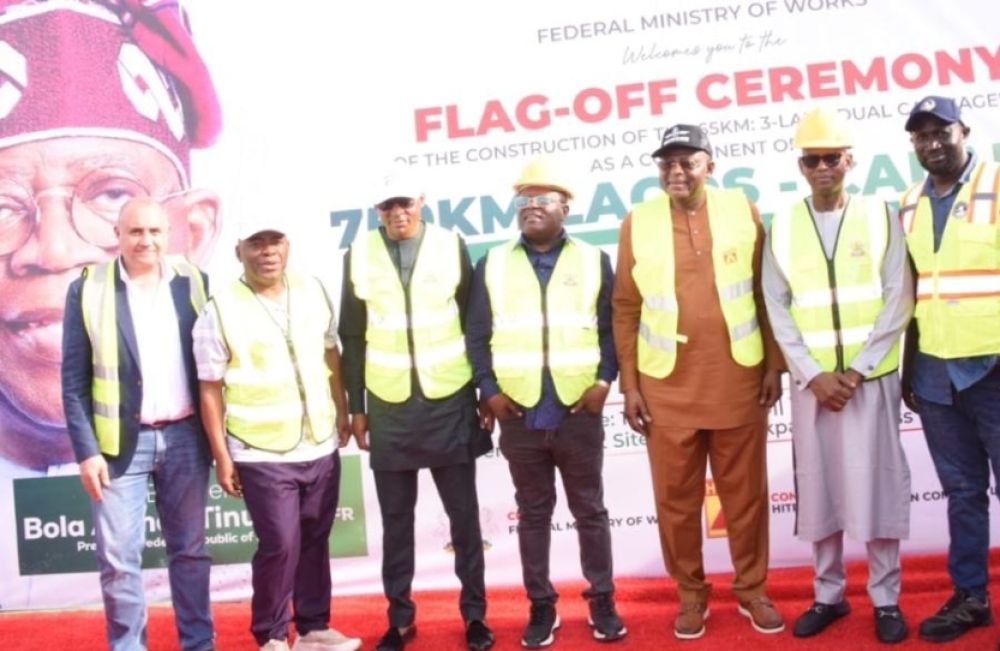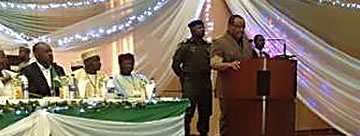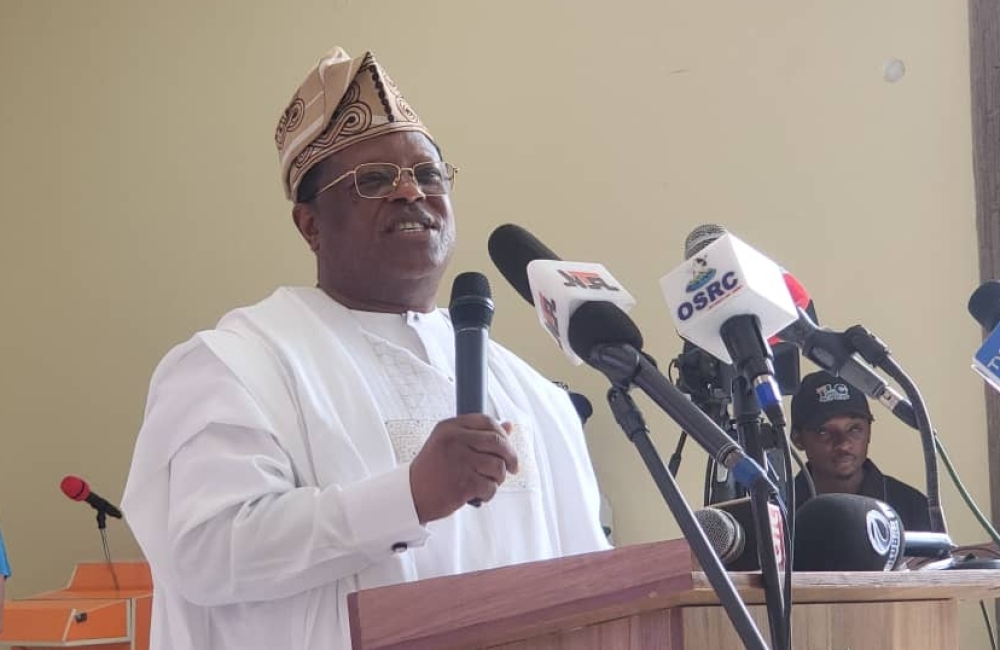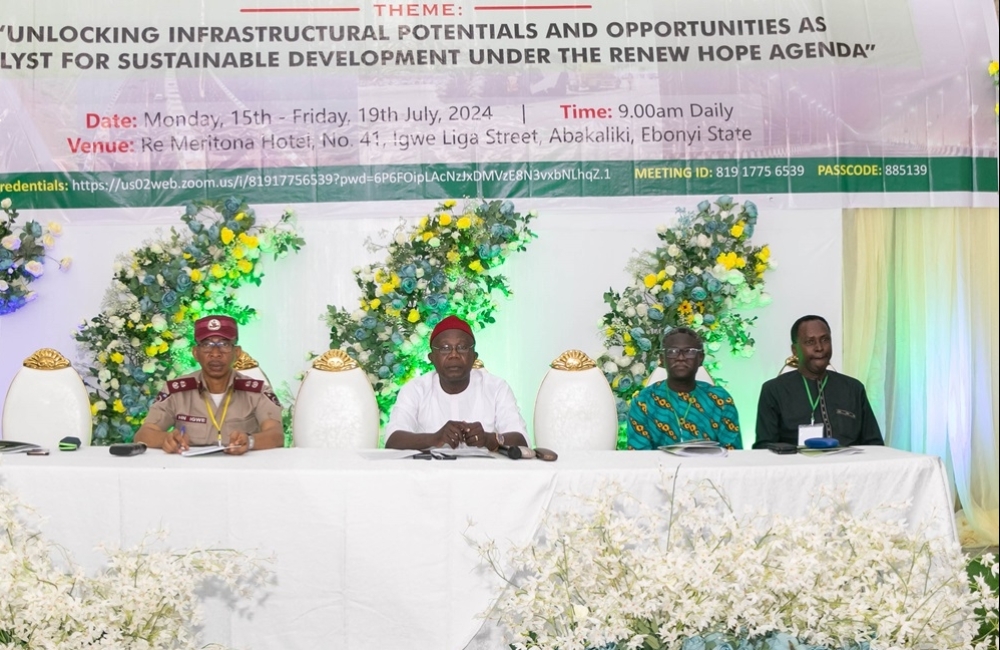PROTOCOL
It is my pleasure and honour to welcome you to the 20th National Council on Works, being the second since my assumption of duty as the Hon Minister of Works. The theme for this year’s Council Meeting "Reforming the Road Sector for Sustainable Economic Development" is particularly apt in our quest to improve the road infrastructure in Nigeria for economic development. This is in line with the Transformation Agenda of the present administration which seeks to "deliver better and safer roads to Nigerians" Road Users as to enhance economic development and national integration. As we begin deliberations at the 20th National Council of Works, we must bear in mind the importance of Road Sector to the socio-economic development of our nation. It would be recalled that far-reaching decisions were taken at the 19th Council on Works in Lagos last year to set the platform for the Ministry under my leadership to revolutionalize the road sector for economic development of our country. Since then, the Ministry has made giant strides in ensuring that institutional reforms in the road sector that would stimulate private sector financing of road infrastructure in Nigeria, are put in place. For example, two draft bills for the creation of the Federal Road Authority and National Road Fund arising from the Ministry’s Road Sector Reform Committee’s report, have been approved by the National Council on Privatization and reviewed by the Federal Ministry of Justice.
The two draft bills will soon be presented to the Federal Executive Council for approval, before their transmission to the National Assembly. When passed into Law by the National Assembly, the bills would not only attract huge private sector funds required to fill the funding gap in the development of road infrastructure, but would also lead to the creation of more business opportunities for engineering professionals and create jobs for Nigerians. Similarly, the Ministry has commenced the implementation of new policies towards better service delivery. They include the use of bitumen emulsion in all road projects in line with the Kyoto Protocol that discourages emission of gases that increase global warming, and abolished the use of kerosene on any road project in Nigeria. Another policy that has come into operation and which has had the most salutary effect on service delivery in line with the performance management, mantra of the President Goodluck Jonathan’s administration is the development of a new template for preparing interim statements of contractors. This policy ensures that only works of a permanent nature are included in interim statement valuations for payment. This has saved the Federal Government huge sums of money hitherto lost to washouts on works that have been certified and paid for. The new mandatory requirement for a detailed geotechnical studies authenticated by the department of Geotechnics, Materials & Quality Control before a project is designed, is another of such policies.
The Ministry is working with relevant Government agencies and private sector organizations to ensure that the National Tolling Policy is in place before the end of this year as we work towards achieving private sector financed road infrastructure in the country. Consistent progress is being recorded in the ongoing rehabilitation and reconstruction of key arterial roads and bridges with enhanced funding by the SURE-P in the six geopolitical zones of the country. I am happy to inform Council that the Office of the Surveyor-General of the Federation, Federal Ministries of Lands, Housing & Urban Development and Justice are collaborating to ensure that all Federal Highways’ "Right of Way" are acquired and gazetted to avert encroachment in accordance with the Federal Highway Act CAP 135. Similarly, the Federal Government has commenced the implementation of Council’s approval for all Federal Roads within 5-10km radius from the city centre of State Capitals to be ceded to the States. This is to form part of the State Road Network for its control and maintenance, while State Governments that have met the pre-conditions for intervention on rehabilitation and/or maintenance of federal roads in their States, would be reimbursed soon.
In the last two years, the Ministry has made significant progress in the rehabilitation, construction, reconstruction, expansion and maintenance of key arterial roads across the six geopolitical zones of the country. This has resulted in reducing travel times, transport fares by commuters, and cost of maintaining vehicles by transporters. When aggregated, it is appropriate to say that the Ministry is progressively moving towards giving Nigerians a better road network for sustainable economic development. In spite of their importance, roads in most developing countries are often poorly financed and managed. Consequently, between 30% and 50% of roads in developing countries are in poor condition, costing the national economy about 3.5% of the GDP annually. Mainly, this is as a result of increased vehicle operating cost, longer travel times, higher accident rates, more freight damage and additional cost of roads rehabilitation. According to a World Bank Report (1988), poor financing of road infrastructure by the public budgeting procedures and poor management by the public road administrations, have been identified as major causes of the deterioration of roads in developing countries.
Further challenges include the 2.5% population growth rate per annum, and high level of vehicles importation into the country. In 1983, only 150,000 vehicles were plying Nigerian Roads. Today, the number has grown to nearly 10 million, as everything from ordinary groceries to goods/services is conveyed from one place to another through the road network. In addition to this, is the excessive axle loading on our roads, occassioned by the movement of heavy articles such as steel billets, cement, iron rods and most recently power turbines on the road.
All these contribute to making rehabilitation and maintenance of the roads expensive but inevitable. Nigeria, like most African countries, has a huge infrastructure deficit. Physical infrastructure such as roads, houses, power and water are essential for the growth of any economy. With adequate investment in infrastructure, the deficit could be removed. For the road sector alone, it has been estimated that in order to adequately support economic growth at current growth rate and meet Vision 20:2020 target, we need to invest in the construction of at least 14,000km of new roads annually for the next seven years. We will also have to maintain and rehabilitate the existing road network as a matter of routine. This will require the average annual expenditure on roads to increase seven-fold to nearly 750 Billion Naira. Vision 20:2020 requires that Nigeria attains a GDP of at least $900 billion by the year 2020 and GDP per capita of at least $4,000. Experience has shown that there is a direct link between economic growth and the size and condition of road networks. For every $1 spent on road maintenance, there is a corresponding increase in the nation’s GDP. The nexus between road development and sustainable economic growth makes it imperative for the improvement of road network. I wish to submit that with the right institutional and legal frameworks in place, the road sector will definitely be attractive to both local and foreign investors. Equally, the introduction of Performance-based road management and maintenance Contracts (PBC), will improve effectiveness and efficiency in executing road maintenance. Distinguished Stakeholders, it is imperative that we should rise up to this great challenge of reforming the road sector for sustainable economic development. We must move away from the palliative approach to road development to taking bold approaches.
Furthermore, enhanced collaboration between the three tiers of government and the private sector will help to produce the desired results, and place the country at par with emerging nations such as Indonesia, South Africa, India, Mexico, Turkey and Saudi Arabia. For Nigeria to be able to bridge the gap between her and these countries there must be strong collaboration with the private sector and multilateral agencies like the World Bank, Africa Development Bank and other development agencies. The conducive democratic environment in the country has started to yield encouraging foreign private investment with over USD300 million funding of road projects under the Road Sector Development Team, the collaborative platform of the Federal Ministry of Works. It can only get better with visionary leadership approach and more fruitful discussions on investment opportunities in the country.
Again, the Ministry is taking a number of steps not only to ensure that Direct Foreign Investments (DFIs) and Public Private Partnerships (PPPs) thrive in the development of road infrastructure in Nigeria, but also to guarantee transparency and accountability in the process. These efforts are underscored by the fact that Government alone can no longer fund huge projects portfolio due to limited financial resources. Many of you are aware that the Government has recently embarked on a number of Public Private Partnership projects as means of delivering some critical national infrastructure such as the construction of the Second Niger Bridge. As engineers and infrastructure professionals, you understand that the Public Private Partnership project development process takes longer time than EPC procurements.
Clearly, there is global competition amongst nations to attract private capital into infrastructure through Public Private Partnership and other forms of engaging private capital. One of the essential ingredients for attracting private finances is the existence of strong institutions that provide the platform for collaboration as well as rekindle investor’s confidence. We must continue to innovate and build sustainability in all our endeavours. It is in the light of this that I strongly recommend that during this Meeting of the Council on Works, we should brainstorm on new ways of funding road infrastructure in Nigeria. In that regard, I would like to offer the following suggestions for the consideration of Council:- In my considered opinion, the funding options that have the potential to provide adequate, reliable and timely financing for Key Infrastructure fall into three broad categories namely:
A. On-budget Public Funding
• Regular Budgetary Allocation
• Enhanced Statutory Allocation
• Viability Gap Funding
B. Off-budget Public Funding
• Special Intervention Funds
• FGN Bonds (To be issued by DMO)
• Concessionary Loans (e.g. from EXIM Banks)
• Credit Enhancements
• Grants (e.g. JICA, DFID)
C. Private Sector Resources
• Pension Fund
• Public Private Partnership
• Long-Term Commercial Bonds
• Export-Credit Finance
• Oil for Infrastructure Scheme
• Private Equity
• Infrastructure Bonds No doubt, the reality of our nation today is that there is a yawning gap in key infrastructure in Nigeria. This gap pervades the various sectors of the nation’s economy; such as power, roads, rail, air transportation, mining, water resources, ICT and housing. Bridging the infrastructure gap in our country requires an attitudinal change in both policy formulation and policy implementation.
The following actions are recommended to address the challenges:-
1. A declaration of emergency in the Infrastructure sector;
2. Establishment of an Infrastructure Development Fund (IDF);
3. Implementation of the National Integrated Infrastructure Master Plan as a first line charge on the Federation Account over a 10-year period;
4. Enthronement of Good Corporate Governance that requires an amendment to the Company and Allied Matters Act, which allows companies to contribute 3-5% of their pre-tax income to the IDF;
5. Enacting into law the Road Sector Reform Bills that will bring about appropriate institutions in the road sector.
CONCLUSION Distinguished Stakeholders, Ladies and Gentlemen, clearly, good and sustainable infrastructure is needed in Nigeria not only to serve as catalyst for economic growth, but also for the creative engagement of citizens. Since the purpose of government is the pursuance and nourishment of happiness for the greater number of citizens, and considering that lack of key infrastructure has been the bane of economic growth and development in our country, the executive and legislative arms of government should imbibe attitudinal change and collaborate together in order to bridge the huge infrastructure gap in our country and take Nigeria to the next level. I thank you for your attention.
Arc. Mike O. Onolememen, fnia, fnim, fnis Honourable Minister of Works






